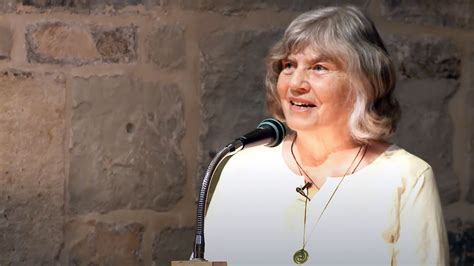A Quote by Plutarch
Justice makes the life of such as are in prosperity, power and authority the life of a god, and injustice turns it to that of a beast.
Related Quotes
Prayer that works is prayer that makes a difference, contemplation that turns into action, on behalf of peace and justice in a troubled and unjust world system. Prayer is energy, the energy of love and transformative power. It is given to us to use for the good of all creation. In prayer God gives us the fuel of life, and asks us to live it.
King Hussein of Jordan dedicated his life - I witnessed it in his sleeping as well as waking hours - to trying to break through the impasses keeping people apart. He understood that the security and prosperity of any one of us in this world depends on the security and prosperity enjoyed by others. As Martin Luther King said, "Injustice anywhere is a threat to justice everywhere." In the Middle East, nothing could be more true.
When we look at the cross we see the justice, love, wisdom and power of God. It is not easy to decide which is the most luminously revealed, whether the justice of God in judging sin, or the love of God in bearing the judgment in our place, or the wisdom of God in perfectly combining the two, or the power of God in saving those who believe. For the cross is equally an act, and therefore a demonstration, of God’s justice, love, wisdom and power. The cross assures us that this God is the reality within, behind and beyond the universe.
...the statement, "The purpose of the law is to cause justice to reign," is not a rigorously accurate statement. It ought to be stated that the purpose of the law is to prevent injustice from reigning. In fact, it is injustice, instead of justice, that has an existence of its own. Justice is achieved only when injustice is absent.
It is altogether unlawful to kill oneself... Wherefore suicide is contrary to the inclination of nature, and to charity whereby every man should love himself... Life is God's gift to man, and is subject to His power, Who kills and makes to live. Hence whoever takes his own life, sins against God... for it belongs to God alone to pronounce sentence of death and life.
Conscience, the sense of right, the power of perceiving moral distinctions, the power of discerning between justice and injustice, excellence and baseness, is the highest faculty given us by God, the whole foundation of our responsibility, and our sole capacity for religion. ...God, in giving us conscience, has implanted a principle within us which forbids us to prostrate ourselves before mere power, or to offer praise where we do not discover worth.
Gratitude unlocks the fullness of life. It turns what we have into enough, and more. It turns denial into acceptance, chaos to order, confusion to clarity. It can turn a meal into a feast, a house into a home, a stranger into a friend. It turns problems into gifts, failures into successes, the unexpected into perfect timing, and mistakes into important events. It can turn an existence into a real life, and disconnected situations into important and beneficial lessons. Gratitude makes sense of our past, brings peace for today, and creates a vision for tomorrow. Gratitude makes things right.
Every institution places its ultimate weight on preserving its own life. That is why the Church emphasizes loving God over loving one's neighbor.... The push for justice on the other hand might be at the center of the Gospel but it also attacks the balance of power in the society. Since the rich always exploit the poor, to give the poor power, dignity and humanity makes them less pliable, less cooperative.
God has ordained the state as a delegated authority; it is not autonomous. The state is to be an agent of justice, to restrain evil by punishing the wrongdoer, and to protect the good in society. When it does the reverse, it has no proper authority. It is then a usurped authority and as such it becomes lawless and is tyranny.









































